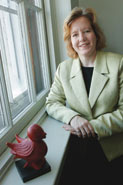Johanne Pelletier: Impartial good governance
Johanne Pelletier: Impartial good governance McGill University
User Tools (skip):
Johanne Pelletier: Impartial good governance
Secretary General Johanne Pelletier said she is known as a somewhat outspoken person. Colleagues even asked her how comfortable she would be in a role that demands she take more of a back seat when animated discussions ensue at meetings. "One of the gifts of this job is the opportunity to listen. When you are not making a pitch for something, you are able to listen at a different level. That's a terrifically fun part of the job. I am the impartial person at the meeting, ensuring things happen as they should."

Johanne Pelletier aims for a transparent government
Owen Egan
Impartiality is a vital issue for Pelletier. "The office organizes and serves as the home base for tribunals, staff grievances and staff appeals. We provide an impartial home for those proceedings. We ensure committees are put together and that the schedule is respected for the critical task of putting academics through the tenure process according to the regulations."
She believes one of the more visible successes of her office are the numerous graduation ceremonies organized on campus every year that work seamlessly. Twelve convocation ceremonies are planned for the spring and she said they demand an enormous behind-the-scenes effort on the part of the staff who put it together.
Pelletier steps into her new position with some preliminary priorities already in mind, ranging from making governance information more easily available, creating more specific guidelines around the use of the McGill logo and name, and using information technology to improve record keeping.
Members of the McGill community need to be more aware of how the university is governed. Pelletier finds that many of the secretary general's office functions are invisible to the McGill community and found some evidence of this during a presentation she did as part of the Human Resources Orientation program in the fall. Some staff members who had been in the university for up to 20 years came up to her afterwards to say they had never before fully understood what Board and Senate do.
"I really think it's important, no matter where you work, whether you're an academic, a secretary, a director or a groundskeeper to know about governance at McGill.
"I want to develop our website to increase transparency about information relating to governance." She wants members of Senate, for example, to know well ahead of time if budget information or policies will be presented at a meeting, so they have the chance to review the documents beforehand.
The second area Pelletier identified as an important priority is how McGill is marked at key corporate functions. "The McGill name and logo are among our most important assets. I would like us to better understand how we protect it and how we enable those who have entitlement to use it, to use it better. We also need more specific guidelines and policies around how we handle access to information requests."
As director of archives, Pelletier had a firsthand look at how records should be kept, and plans to use information technology to manage paperwork and improve governance record keeping. She wishes to eliminate duplication and digitalize key records so they are more easily accessible, and is considering paperless options for some functions such as tenure proceedings. Her office will consult with academics to see how it could be made more efficient for everyone.
Pelletier said one ongoing challenge is to retain the confidence of all constituencies in the secretary general's impartiality. "Maintaining the perception of impartiality is always critical. Staff are very keenly aware of the need to present ourselves as open to all constituencies. The challenge is that we are always serving many masters: the Board, the Senate, and all governance committees."

